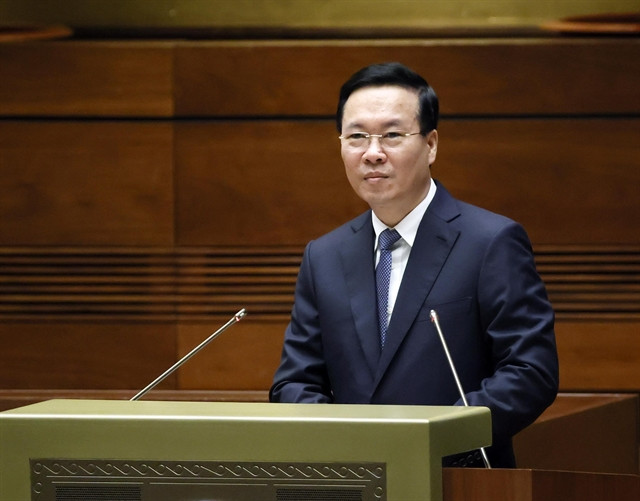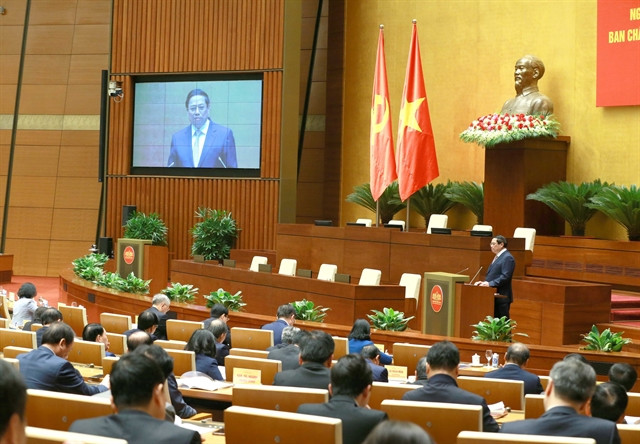National conference on resolutions of 8th Party Central Committee
The hybrid conference focuses on studying the resolution released at the eighth session of the 13th Party Central Committee.
 |
| State President Vo Van Thuong delivers a speech at the conference on studying the resolution released at the eighth session of the 13th Party Central Committee on Monday |
The Politburo and the Party Central Committee on Monday organised a nationwide conference to study the resolution released at the eighth session of the 13th Party Central Committee.
The hybrid conference attracted more than 1.44 million officials and Party members nationwide, focused on core issues and new features of the resolution, thus enhancing officials and Party members’ awareness of their responsibility in implementing tasks set in the resolution.
The conference enabled Party Committees, Party organisations and ministries, sectors and localities to continue to popularise the resolution to the lower level and build their own plans and action programmes to implement the resolution practically and effectively.
At the event, State President Vo Van Thuong, who is also a Politburo member, delivered a speech on continuing to promote the tradition and strengths of great national solidarity for building a more prosperous and happy nation.
President Thuong mentioned that there had been many changes in the region and the world over the past 20 years since the implementation of Resolution No 23-NQ/TW of the 9th Party Central Committee on promoting the strength of the great national solidarity.
Emphasising the necessity of Resolution No 43-NQ/TW, President Thuong stated that the Party had four comprehensive viewpoints in the resolution, affirming the position and role of the great national solidarity.
Firstly, great national solidarity is a precious tradition and the guiding ideology and strategy throughout the Party's leadership. The important foundation is the class alliance of workers, farmers, and intellectuals led by the Party, within the Party, among the Vietnamese people at home and abroad, and between the Vietnamese people and people worldwide.
Secondly, the common goal of the nation to promote the tradition and strength of the great national solidarity is to build a prosperous and happy country, becoming a developed country with high income by 2045.
Thirdly, national solidarity must be associated with promoting socialist democracy, respecting and ensuring human rights, citizens' rights, and the people's mastery in all aspects of social life. Democratic elements are emphasised in this context.
Fourthly, great national solidarity is considered the cause of the entire people, the responsibility of the Party, and the entire political system. Of that, the Party plays the most important role. The Vietnam Fatherland Front and other political and social organisations play a core role.
 |
| Prime Minister Pham Minh Chinh delivers a speech on renewing and enhancing the quality of social policies in the new period |
Also at the event, Politburo member and Prime Minister Pham Minh Chinh stated that the eighth session of the 13th Party Central Committee passed four important resolutions, including Resolution No 42-NQ/TW on renewing and enhancing the quality of social policies to meet the requirements of the national building and defence in the new period.
Providing a comprehensive assessment of the results achieved in the ten years of implementing Resolution No 15-NQ/TW on certain issues regarding social policies during the 2012-2020 period, the Prime Minister emphasised significant improvements in the material and spiritual lives of people across the country, with comprehensive and harmonious socio-economic development.
Despite the achievements, there are still some limitations and shortcomings, such as the limited coverage and risk-solving capacity of social policies, unstable poverty reduction, the underdeveloped labour market, basic social services not meeting people's needs, and limited capacity and resources for environmental protection, disaster response, and climate change adaptation.
Regarding the new and outstanding points of Resolution No 42-NQ/TW, PM Chinh mentioned that the resolution on social policies shifted the approach from "ensuring and stabilising" to "stabilising and developing."
"The resolution is closely linked to the management of sustainable social development, improving the overall social welfare and ensuring social and human security. It also focuses on social development and progress through human development, serving as a driving force for economic development," he added.
Notably, PM Chinh said, the Resolution No 42-NQ/TW expanded its scope to cover all social policy groups, including policies for those who have contributed to the revolution, labourers, vulnerable groups, the poor, ethnic minorities, and those facing difficulties in remote and mountainous areas.
Regarding the general goals by 2030, Resolution No 42-NQ/TW clearly defines the building of a sustainable, progressive, and fair social policy system; the improvement of a comprehensive, modern, and sustainable social security policy; and the development of a flexible, efficient, and internationally integrated labour market. This will help place the country among the group of nations with a high Human Development Index (HDI) globally by 2045.
He also highlighted some key points in Resolution No 42-NQ/TW, including building and developing a flexible, diverse, efficient, sustainable, and integrated labour market, ensuring all citizens have access to and benefit from basic social services.
In terms of social housing construction, the plan aims to build at least one million social housing units by 2030; develop a national framework for adapting to an ageing population and adjusting the replacement fertility rate, and becoming a pioneering country in the global programme on employment and social security promotion in line with the initiatives of the United Nations and the International Labour Organisation.
VNS-THANH BINH
